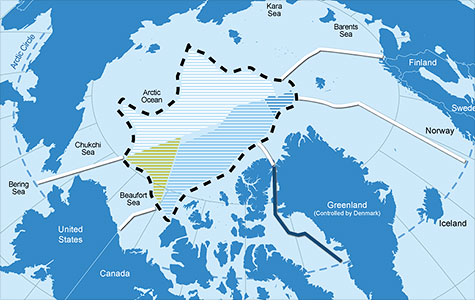Search News

The United States missing out on an Arctic land grab because it won't ratify a treaty that would assign territorial claims at the top of the earth. Click to expand.
NEW YORK (CNNMoney) -- There's an international race to divvy up the Arctic Ocean's oil and mineral bounty, but the United States could lose out on a big chunk of it because it hasn't signed a United Nations treaty governing the area.
Earlier this week two key U.S. senators announced they would not support ratifying the Law of the Sea Treaty. The treaty codifies a whole host of maritime laws and customs which could help smooth tensions simmering in the Arctic.
The U.S. has refused to participate before, and this latest rejection means that there probably won't be enough votes to ratify the agreement 161 other nations have signed.
One provision in the treaty allows countries to extend their territorial claims beyond the 200-mile limit currently allowed -- if they can prove the continental shelf extends 200 miles beyond its shores.
That provision has allowed four of the five high Arctic maritime countries -- Russia, Canada, Denmark (via Greenland), and Norway to lay claim to a vast swath of the central Arctic ocean.
The United States could also claim a significant chunk beyond its 200-mile limit off Alaska, if it signed the treaty. But until it does it can't. It also means the U.S. has little say in the territorial claims of the other countries.
"This could be an enormous area for the United States to protect, explore, or exploit," said Heather Conley, director of the European program at the Center for Strategic and International Studies. "But until we ratify that treaty, we will remain on the sidelines."
Extending a country's claim is just one of the geopolitical issues facing the Arctic as the ice melts and oil companies, shipping firms, mining giants and militaries move in to tap the Arctic's vast resources.
Opposition to the Law of the Sea treaty in the United States comes mostly from Republican senators, wary of granting too much control to the United Nations.
"No international organization owns the seas," Ohio Republican Rob Portman, one of the two lawmakers to announce opposition to the treaty, said in a statement on his website. "We simply are not persuaded...this treaty will be more favorable to U.S. interests than bilateral negotiations, voluntary arbitration, and other traditional means of resolving maritime issues."
In the Arctic at least, the resources the U.S. might lose out on are relatively small -- most of the sizable conventional oil and gas reserves fall within 200 miles of the coast, according to the U.S. Geological Survey.
But there are other disputes in the Arctic.
Russia has yet to formally agree on the boundary between U.S. and Russia in the Bearing Sea, according to a report by the U.S. Congressional Research Service, a non-partisan research arm of Congress.
The United States and Canada are in disagreement over a slice of water between their two countries, and Norway and Russia have yet to resolve a decades-long spat over a particularly resource-rich block in the Barents Sea.
The most conflict-prone of the disputes may be over which country has control of the two seaways that traverse the Arctic -- the Northwest Passage along the Canadian coast and the Northern Sea Route on the Russian side.
The United States, Europe, and many other nations contend the sea lanes are transit straits connecting two oceans, and as such ships making the trip should be subject to relatively unimpeded travel.
Canada and Russia claim the passages are part of their inland waterways, subject to the rules, restrictions, surveillance and possible imposition of hefty transit fees by the host country.
Russian President Vladimir Putin has said the Northern Sea Route could one day rival the Suez Canal in terms of ship traffic. The Suez generates $5 billion a year in revenue for Egypt.
Much has been made of these Arctic disputes, as well as what appears to be a military build-up in the region.
In 2008, shortly after planting a Russian flag on the bottom of the ocean at the North Pole, Russia conducted long-rage strategic bomber flights over the Arctic -- the first such exercises since the end of the Cold War, according to the CRS report.
Meanwhile Canada has constructed a cold-weather training base in its Arctic territory, and ordered the construction of six ice-capable ships to patrol the Northwest Passage.
Yet despite these moves, most analyst say a military confrontation in the region is unlikely.
Four of the five Arctic states with competing claims are NATO members. And if the United States and Russia were able to survive 40-plus years of Cold War antagonism, it's unlikely they'd go to war over shipping fees or drilling rights.
Programming note: Learn more about Shell's (RDSA) gamble to establish a new oil source in one of the harshest climates on the planet. Watch "Cold Wars: Drilling in the Arctic," on "OutFront with Erin Burnett," Wednesday night at 7 p.m. ET on CNN. ![]()
| Overnight Avg Rate | Latest | Change | Last Week |
|---|---|---|---|
| 30 yr fixed | 3.80% | 3.88% | |
| 15 yr fixed | 3.20% | 3.23% | |
| 5/1 ARM | 3.84% | 3.88% | |
| 30 yr refi | 3.82% | 3.93% | |
| 15 yr refi | 3.20% | 3.23% |
Today's featured rates:
| Latest Report | Next Update |
|---|---|
| Home prices | Aug 28 |
| Consumer confidence | Aug 28 |
| GDP | Aug 29 |
| Manufacturing (ISM) | Sept 4 |
| Jobs | Sept 7 |
| Inflation (CPI) | Sept 14 |
| Retail sales | Sept 14 |